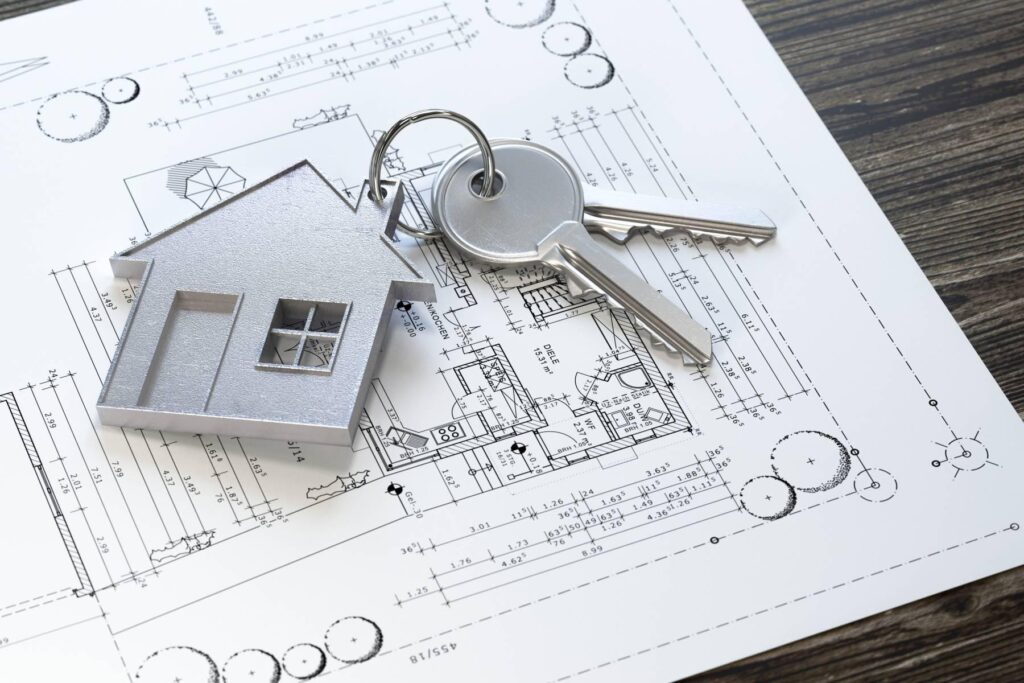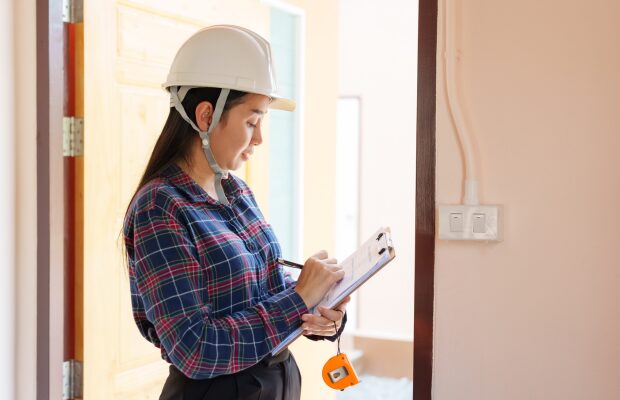You may have heard the term ‘buying off-plan’.
And if you’re looking to purchase a new-build property in London, doing so off-plan could be an option for you.
But what does off-plan mean, what are the benefits of buying in this way and what are the risks?
We’ve outlined everything you need to know right here…
What does buying property off-plan mean?
When you buy a property off-plan, you agree to purchase it before it’s been built, or while it’s under construction.
In some cases, you might buy completely off-plan – meaning the foundations of your new home have not even been laid.
But in most off-plan purchases, you’ll buy while the property is being constructed.
What to expect when buying off-plan
As you might expect, the process of buying off-plan is a bit different to buying a property on the open market.
Here’s what you can expect from the process:
View the brochure
Your developer should have a brochure where you can view the plans for the site, and floor plans and Computer Generated Images (CGIs) of how each property will look. The brochure should also contain:
• Details on the specification of each property and its fixtures and fittings
• Information on what’s included with the property
• Details on the warranty that comes with the property
View the show home
Once your developer has completed the first build on the site, it will usually be converted into a show home – sometimes with a sales office inside or in a converted garage. You’ll be able to book an appointment to view the show home, which will give you a good idea of how the other homes on the development will look and feel.
Reserve your plot
If you decide to go ahead and buy off-plan, you’ll be able to reserve a plot on the development.
You’ll pay a reservation fee at this point, which will secure the plot and the property being built on it, for you.
You might also be able to specify certain fixtures, fittings and finishes you’d like – for example, tiles, flooring and paint colours.
Arrange your mortgage and appoint a solicitor
Once you reach the stage where you’ve reserved a property, you’ll be able to start the process of applying for a mortgage and appointing a conveyancer to do the legal work on your purchase.
Exchange contracts
Once your legal work and mortgage is arranged, you’ll be able to exchange contracts with your developer which makes the purchase legally binding.
If you were buying an existing property at this point, there’s a strong chance you would then complete the purchase and receive the keys within a week.
But by buying off-plan, the gap between exchange and completion is longer – because your home is actually being built!
Completion and snagging
Once your new home is finished, you’ll agree a moving-in date with your developer.
Before you move in, you’ll have the opportunity to tour your new home and pinpoint anything that you’re not happy with or any defects you want rectified, which is known as ‘snagging’.
The risks with buying off-plan
There are always risks when buying property – but these tend to differ when you’re buying off-plan.
Build delays
Delays in construction can be common and this can sometimes impact on you if you’re buying off-plan.
For example, if you secure a mortgage offer that is valid for six months, but your new home is delayed, you could find yourself having to re-apply.
Market fluctuations
The property market can fall as well as rise, like we’ve become used to for so long.
If the market falls heavily while your home is being built and after you’ve exchanged contracts, you could end up paying more for it than it ends up being worth – leaving you in negative equity.
Negative equity is where your home is worth less than the mortgage secured on it – and this means you may find it difficult to sell or remortgage unless prices rise again.
Is it cheaper to buy property off-plan and can you negotiate price?
Buying property off-plan can come with a discount if you’re open to negotiating with a developer.
However, how much you’re able to negotiate off the asking price will depend on:
• How buoyant the market is
• How much interest the developer has in the plots
The best deals are often found at the beginning of a project, where the developer is looking to make some early sales towards funding the rest of the development.
Cash buyers are also more attractive to developers and can often secure the best deals.
But you should always try to negotiate a deal at any stage – even if you’re unable to secure a discount off the asking price, the developer might be willing to cover some of your costs, like stamp duty.
Top tips for buying off-plan in London
Buying off-plan can be daunting – mainly because you don’t get to look around the property as it won’t be built.
But by understanding the process before committing to purchasing off-plan, you’ll have a better idea of what to expect. Here are our top-9 tips for buying off-plan in London…
1. Do due diligence on your developer
It always pays to do your research on any company before you commit to spending money with them – and as a property purchase is a substantial amount of money, doing due diligence on the developer you’re buying from is key.
Ask them about their plans for the development you’re looking at and the timeframes they have in mind to complete it.
And request, or look online, to see other developments they’ve worked on.
If any are near you, you could also take a trip to look at those properties and speak to people who have bought them – both of which can give you a much better idea if you want to buy from them.
2. Research plans for the area
In the case of big developments which will bring a lot of people to an area, you’ll want to be sure the local amenities are up to that increase in population.
Think about things like Underground transport links, shops, doctors surgeries and leisure facilities and try to find out if plans are in place to expand and improve those services with more people living in the area.
3. Keep in touch with the developer
Once you’ve exchanged contracts, you’re committed to your purchase – but you might not move into your new home for many months, or even a few years, depending on the size of the development.
Construction projects do sometimes fall behind, so stay in touch with the developer and maintain open dialogue, alongside regular visits to see how your property is progressing.
4. Use specialists in key areas
Buying a property off-plan is very different to buying a home that already exists – so using specialist services for off-plan purchases can be beneficial.
Consider using a mortgage broker with access to lenders who may be willing to extend your mortgage offer, sometimes to 12 months – if your build falls behind, you could find yourself having to re-apply for your mortgage if the standard offer period of three-to-six months expires before you complete.
Using a solicitor who specialises in off-plan property can also be advantageous, as they’ll be experienced in the legalities and processes involved.
5. Be thorough with snagging
As beautiful as your new home might be, there’s also a chance that defects or issues might occur – so, when you tour the property to undertake a snagging process, make sure you’re thorough.
The snagging process is your chance to point out the things you’re not happy with or any issues that could cause you a problem when you move in – and your developer should fix these with no extra cost.
However, anything you find after your snagging period expires could cost you to fix, so be thorough.
6. Consider the future
Your new property should be a solid investment as well as a beautiful new place to call home.
So, when exploring your off-plan buying options, think about the future and, in particular, who your buyers might be if you come to put your property on the market.
Is it in an up-and-coming area, or do property prices struggle to keep up with other more desirable locations nearby?
Are most buyers locally families, or is your area a haven for young professionals?
If you’re buying a small flat in an area dominated by family homes, your pool of potential buyers in the future might be limited, but if you’re in an area where younger buyers want to be, you could find your property in high demand.
7. Be quick out of the blocks
With new developments, speed can sometimes result in a deal.
Developers often need to sell a first batch of plots quickly to help them fund the rest of the project – so, if you can get in early, there could be a deal to be done.
8. Factor in your additional costs
Even though the process of buying off-plan takes longer, sometimes years, you should always factor in your additional costs for buying your new home early in the process.
Although many of your costs won’t need to be paid for some time, you should create a ringfenced fund to cover things like:
• Stamp duty
• Solicitor fees
• Mortgage lender fees
• Removals costs
9. Find out what happens if your property is delayed
Delays in construction happen – and more often than not, they’re out of your developer’s control.
In the UK, the biggest cause of construction delays is the weather.
However, delays can cause you problems – especially with your mortgage, if your offer expires before you complete.
Find out from your developer what happens in the event of a long delay and ensure that a ‘long-stop’ date is pencilled into your contract.
This is the date your property must be completed by, or you’ll be able to pull out of the deal and receive a full refund on your deposit.








